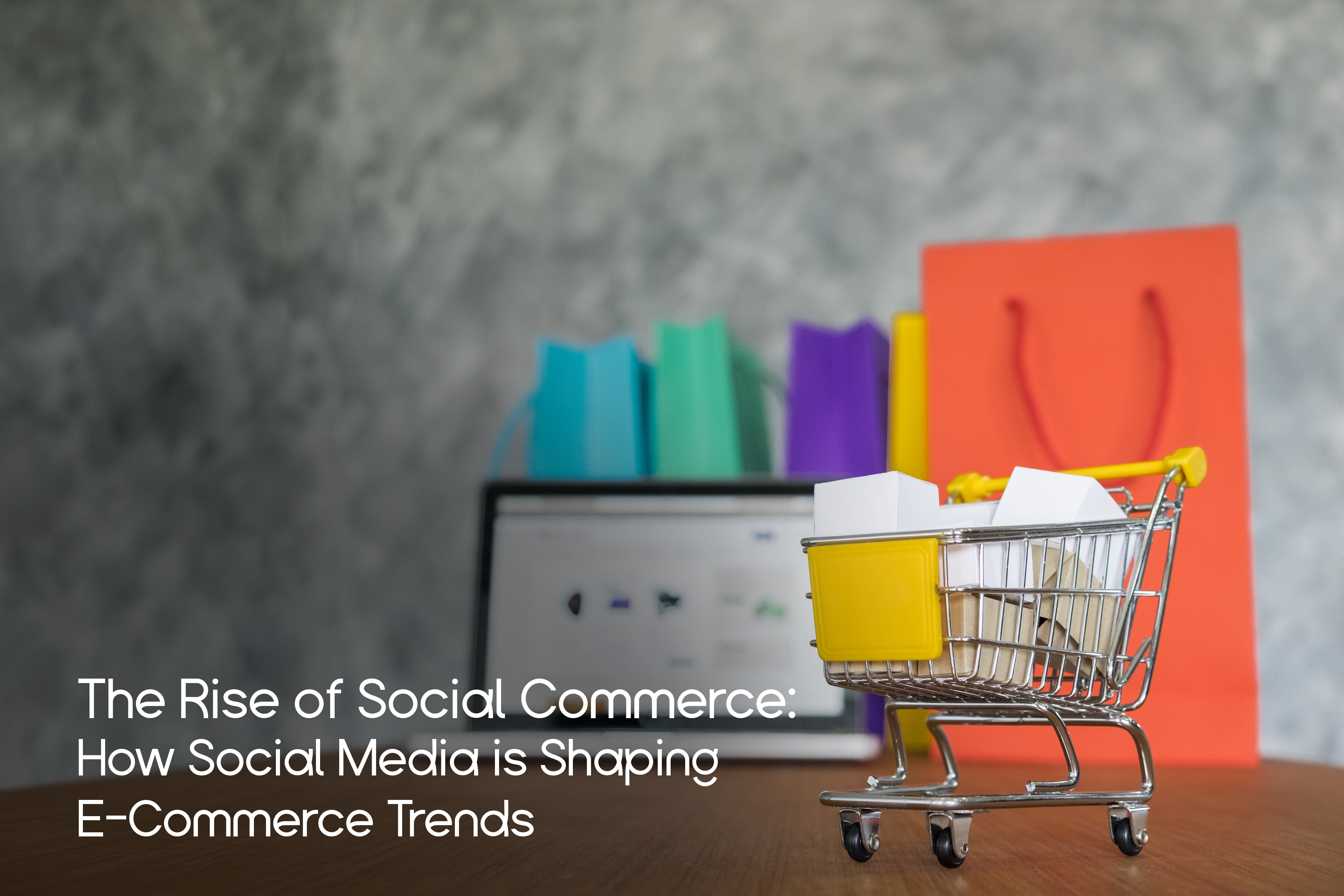The Rise of Social Commerce: How Social Media is Shaping E-Commerce Trends
 22 July 2025
22 July 2025
Table of Contents
- The Rise of Social Commerce
- Evolution of Social Media Platforms
- Integration of Shopping Features
- The Impact on Direct Selling
- Changing Consumer Behavior
- Platform-Specific Opportunities
- Strategies for Businesses
- Technological Innovations
- Future Trends in Social Commerce
- Conclusion: The Secret to Long-Term Success
- FAQs
The Rise of Social Commerce
Social commerce is emerging as an incredibly powerful factor in the world of e-commerce changing the way consumers and businesses interact. Its seamless integration with social media with digital marketing hasn't just transformed traditional shopping experiences, but has also opened up opportunities for businesses to connect with a larger customer base through more targeted and personalised channels. From influencers that promote viral content to platforms-based approaches to e-commerce, social commerce has opened the door to new ways to shop.
Evolution of Social Media Platforms
Social media platforms such as Facebook, Instagram, and TikTok have experienced significant changes over the past few years to accommodate the e-commerce market. The initial purpose was to encourage interactions between people These platforms now offer seamless shopping experiences that allow users to browse products, read reviews, and make purchases without leaving the application. The business models for these platforms have changed to adapt to these new requirements, creating new digital environments that allow direct selling.
Integration of Shopping Features
As social media platforms evolve they are integrating buying features directly into interfaces of their platforms. These features improve the user experience by making it possible for users to purchase items while enjoying content. Facebook Groups, as an instance permit direct sales via making use of Facebook Events and integrated store capabilities, making the buying process easier for customers and businesses. This is a major shift in how online shopping platforms operate, and is promoting an approach to a platform that is more engaging and interactive.
The Impact on Direct Selling
Direct sales have been transformed by the advent of social commerce, which provides innovative and efficient ways for companies to reach out to customers. With the rise of social media marketing as a key component of numerous business models, it is evident that the role of influencers and brand ambassadors, as well as affiliate marketing is increasing in importance.
Seamless Direct Sales Channels
Social commerce has created direct sales channels which make it much easier than ever before to convert interest into purchases. Through the creation of content hubs with the products available, companies can easily introduce new products to an extensive public. By analyzing user interactions businesses can adjust their sales strategies, adjusting for greater content performance. This method utilizes network effects that allow content to be shared by users and can result in rapid growth both in terms of revenue and recognition.
Enhanced Customer Engagement
In the realm of online commerce, the focus isn't just to sell but building meaningful connections with customers. With the help of analytics tools, businesses can analyze engagement metrics, companies can adjust their message to reflect the preferences of their customers. The increasing use in augmented-reality filters as well as live streaming on social media platforms offers customers the ability to customize their shopping experience which allows customers to interact with brands in real-time.
Changing Consumer Behavior
The growth in popularity of the social marketplace has altered the way consumers purchase. The ease of finding and purchasing items from social media has increased the need for more personalized and enjoyable shopping experiences.
Personalization in Shopping Experiences
Nowadays, consumers want personal experiences that reflect their needs. Social commerce platforms use platforms and loyalty strategies to offer personalized shopping recommendations based on previous purchases, browsing patterns and even engagement. With the help of content calendars, companies can design content specific to their market and target the appropriate people at the right moment. Social media platforms like Instagram let businesses showcase specific products with advertisements and influencer campaigns and increase personalization.
The Role of Influencer Partnerships
Influencer marketing is among the main factors driving social commerce. Influencers who have a large following advertise products that are in tune with their target audience's tastes, and thus guarantee an extremely high rate of engagement. Through collaboration with influencers, businesses are able to reach a focused audience, creating the potential for virality for their products. This strategy for marketing makes use of the power of viral content, which spreads rapidly through social media and is a crucial element of a model of business in social commerce.
Platform-Specific Opportunities
The various social networks have distinct opportunities to connect with customers and boost sales. Understanding the intricacies that each social media platform offers is crucial for companies to be successful in the realm of social commerce.
Instagram Shopping
Instagram Shopping lets businesses build a complete shopping experience in the application. By using tags to tag products in stories and posts companies can speed up the process of purchasing and boost sales. The platform has transformed the way companies interact with their customers, transforming content into online stores and providing seamless ways from buying to discovery.
TikTok Shop
TikTok has quickly become an essential player in the world of social commerce due to its approach to selling products via videos in short form. The possibility for creators to directly promote their products to their fans allows TikTok an indispensable instrument for businesses seeking to reach younger audiences. Through the use of strategies for viral content, companies can increase their reach while increasing the conversion rate of sales.
Facebook Marketplace
Facebook Marketplace is now an indispensable tool for direct sales which allows businesses and individuals to sell their products directly through their social networks. Through integration with Facebook Groups and making use of Facebook Events, sellers can advertise their offerings to an active audience.
Pinterest Shopping Updates
Pinterest has made huge advances in social commerce by providing shopping options within its visual platforms. By incorporating shopping tags into Pins and providing product descriptions and data companies can draw in customers that are in the search mode, seeking out new products to explore.
Strategies for Businesses
Businesses must modify their strategies to be successful in the world of social commerce. Integrating videos and influencer marketing in the digital strategies of marketing can help businesses effectively engage with and connect with potential customers.
Leveraging Influencer Marketing
Influencers are essential for driving sales and traffic to social commerce. An effective influencer marketing campaign will increase the reach of your brand and improve conversion rates. Collaboration with influencers lets businesses tap into active audiences who trust the advice of those they follow.
Utilizing Video Content for Engagement
Video content has emerged as an integral part of social media. Platforms such as Instagram, TikTok, and Facebook make video a priority, which makes it a powerful tool for businesses to market their products. Through interesting and educational videos companies can create a sense of community, show their products and increase sales.
The Role of Advertising in Social Commerce
Effective advertising is essential to the achievement of social commerce. With targeted ads companies can target an audience that is targeted with the appropriate message.
Effectiveness of Social Media Ads
Social media advertisements are an integral part in the world of online commerce. The ads can be tailored to specific demographics of the audience and ensure that the correct message is delivered to the right audience. The ability to measure the metrics of engagement and alter ads accordingly makes marketing on social platforms extremely efficient.
Use of Platform-Specific Tools
Each platform provides distinct advertising tools that companies can employ to enhance their advertising campaigns. For example, from Instagram Shopping adverts and Facebook Ads, companies can adjust their strategies for advertising to get the most ROI. Analytics tools aid in tracking the success of these ads to ensure that companies can take informed decisions.
Technological Innovations
Technology is playing an important part in the development of the social marketplace. Innovative technologies like artificial intelligence and user-generated content are accelerating this development.
Integration of AI in Social Commerce
AI is becoming increasingly integrated into social commerce platforms to enhance the user experience. From personalized recommendations for products to advanced chatbots for customer service, AI helps businesses engage with their customers more efficiently and effectively.
The Power of User-Generated Content
User-generated content has become an effective tool to increase sales through social commerce. By taking advantage of customer experience and user engagement, businesses can produce authentic content that is able to resonate with prospective customers.
Future Trends in Social Commerce
As social commerce continues to expand, businesses must keep up with the latest trends.
Growth Among Younger Demographics
Social commerce is especially popular with younger customers and especially Gen Z and millennials. These groups prefer shopping through social media sites, and companies that target this group will experience huge growth.
Evolving Cost-Effective Marketing Opportunities
Social commerce offers businesses an opportunity to market their products at a lower cost. Utilizing tools that are specific to platforms and using content formats that appeal to people, businesses can get an impressive ROI without the huge budgets needed in traditional advertisements.
Conclusion and Implications for Brands
Social commerce is changing the way that businesses sell their merchandise and engage with their customers. With a strategy for platforms that incorporates influencer partnerships, videos, and new shopping features, companies can be successful in the rapidly changing market.
our popular faqs
Answers to Your Most
Asked Questions
How can social commerce affect how traditional retailers operate?
Social commerce has significantly altered how traditional retailers operate, creating more personal, direct, and easy-to-use sales channels. In contrast to traditional retail stores which require customers to visit physical stores or even web-based sites, social commerce allows businesses to sell their products directly via platforms such as Instagram, TikTok, and Facebook. This change gives businesses the ability to interact with customers directly in real-time, eliminating the need for middlemen, and increasing the speed of transactions. Integration of purchasing options on social networks such as Instagram Shopping has simplified the purchasing procedure, thereby making it easy for users to buy on the site.
Which are the top social media platforms that allow social-commerce?
Many social platforms have successfully integrated social commerce capabilities. Instagram Shopping, for instance, allows businesses to include products in their stories and posts that direct you to an e-commerce site for purchases. TikTok has also taken on social commerce by allowing its users to purchase directly from their videos, typically through collaborations with influencers. Facebook Marketplace offers individuals and companies a platform to list and sell items, while Pinterest's shopping updates have assisted customers purchase items directly through Pins. These platforms offer businesses unique opportunities to interact with customers and boost sales via the use of content marketing and user-generated content.
How can companies leverage influencer marketing in social commerce?
Influencer marketing is a crucial element of social commerce because influencers are able to increase sales and engagement. Through collaboration with influencers companies can target specific demographics who are in line with their values. Influencers make authentic content that is a hit with their followers, which makes it more likely for them to buy recommended products. Businesses can work with influencers that align with their brand's value proposition and reputation for their brand to increase trust and boost conversion rates. Be it through live streaming, paid posts or brand ambassador programmes, influencer marketing can be an effective driver of brand recognition and sales.
What role will the role of video play in commerce?
Video content is an essential aspect of social commerce because it offers dynamic and interactive methods for brands to show off the products they sell. Platforms such as Instagram, TikTok, and Facebook place a high value on videos, which makes it important for businesses to integrate video content into their online media strategies. Videos allow businesses to show their products in action, give instructions, or provide insider information that enhances the brand. By creating content for marketing that is directly addressed to the consumer businesses can boost their customer interaction and create more personal shopping experiences that are a hit with their customers.
What are the trends for the coming years in the field of social commerce?
As the world of social commerce continues to grow, businesses will be able to see the integration of AI and other digital technology in buying. AI can assist businesses in providing better customer experiences that are more personalized for customers, for example, by providing recommendations for products based on browsing history or analysing the performance of content. The growing number of young people as the primary consumers of the world of social commerce is expected to affect the types of content used by businesses. In addition, the business models of platforms will be more sophisticated, which will allow for more personalized as well as seamless purchasing experiences. Social commerce is also expected to see new developments such as augmented reality filters and live streaming capabilities that enhance the ways brands interact with their customers.





